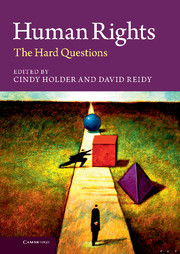Book contents
- Frontmatter
- Contents
- Figure
- List of table
- Notes on contributors
- Introduction
- Part I What are human rights?
- Part II How do human rights relate to group rights and culture?
- Part III What do human rights require of the global economy?
- 8 What do human rights require of the global economy?
- 9 Universal human rights in the global political economy
- 10 Human rights and global equal opportunity
- Part IV How do human rights relate to environmental policy?
- Part V Is there a human right to democracy?
- Part VI What are the limits of rights enforcement?
- Part VII Are human rights progressive?
- Index
- References
10 - Human rights and global equal opportunity
Inclusion not provision
Published online by Cambridge University Press: 05 May 2013
- Frontmatter
- Contents
- Figure
- List of table
- Notes on contributors
- Introduction
- Part I What are human rights?
- Part II How do human rights relate to group rights and culture?
- Part III What do human rights require of the global economy?
- 8 What do human rights require of the global economy?
- 9 Universal human rights in the global political economy
- 10 Human rights and global equal opportunity
- Part IV How do human rights relate to environmental policy?
- Part V Is there a human right to democracy?
- Part VI What are the limits of rights enforcement?
- Part VII Are human rights progressive?
- Index
- References
Summary
Introduction: equal opportunity and the challenge of moral universalism
Political philosophers have long focused attention on the requirements of a just domestic economic system, and one criterion consistently argued for is equal opportunity in terms of education and employment. Roughly speaking, the motivating intuition of the principle of equal opportunity is that no one should be denied an important social opportunity on the basis of a morally arbitrary feature about them. Although controversial or even absurd when applied to some social opportunities, almost all agree that there are some centrally important human activities that no one should be denied access to within their society, such as equal opportunity to education or employment based on ability. Liberal societies typically codify this in law, and social norms have come to reflect this principle of fairness and equality.
Some philosophers have argued that the equal opportunity criterion must be applied globally (Beitz 2001; Caney 2001; Moellendorf 2006; and contra Boxill 1987; Brock 2009; Miller 2002). Taking only education and employment into account, this would transform the global economic system, placing enormous restrictions on the deployment of capital and labor and requiring a worldwide development of educational opportunities that would massively reorient the deployment of resources. Thus, there is at least prima facie reason to be skeptical about whether such a requirement is feasible or desirable. But could it be justifiable to distinguish between the domestic sphere and the global one on the principle of equality of opportunity? This question has particular normative edge for the cosmopolitan, who holds that every person has global stature as the ultimate unit of moral concern, and is therefore entitled to equal respect and consideration no matter what her citizenship status or other affiliations happen to be, or even the non-cosmopolitan who construes human rights as universal, applying equally to every human being.
- Type
- Chapter
- Information
- Human RightsThe Hard Questions, pp. 193 - 208Publisher: Cambridge University PressPrint publication year: 2013
References
- 1
- Cited by



